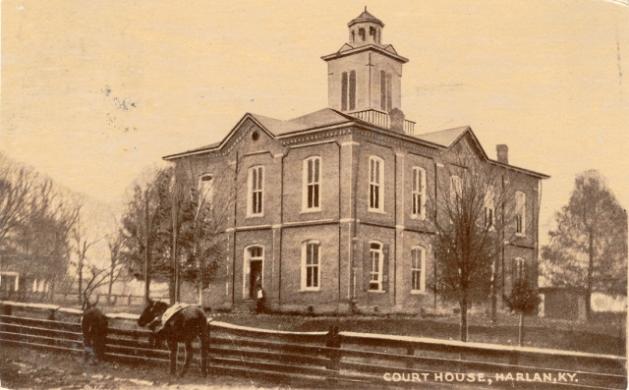
Harlan County Court House, 1886.
Photo from old postcard captured by Keith Vincent. These and others can be found at his web site for all 50 states! www.CourtHouseHistory.com
FLICK (MICHAEL JOSEPH)
VS.
THE ESTATE OF CHRISTINA WITTICH
COA, Published 2/6/2015
OPINION REVERSING AND REMANDING
MAZE (PRESIDING JUDGE); KRAMER (CONCURS) AND J. LAMBERT (DISSENTS AND WILL NOT FILE A SEPARATE OPINION)
MAZE, JUDGE: Michael Joseph Flick appeals from a judgment of the Fayette Circuit Court finding him liable for the wrongful death of Christina Wittich andawarding compensatory and punitive damages to Wittich’s Estate. Flick primarily argues that the trial court erred by denying his motion to dismiss because the complaint was filed beyond the one-year statute of limitations for wrongful death provided under KRS 1 413.140(1). We conclude that the cause of action against Flick accrued no later than the date of his indictment, and, by operation of KRS 413.180, the Estate had two years from that date to bring the complaint. Since this action was not brought within that time, the trial court erred by denying the motion to dismiss. Hence, we reverse the judgment and remand for entry of an order dismissing the complaint.
* * *
As noted above, it is well-established that an action for wrongful death is subject to the one-year statute of limitations in KRS 413.140(1). Conner, 834 S.W.2d at 653-54. Under KRS 413.180, the action must have been brought within one year from the appointment of the personal representative, but not more than two years from the date the cause of action accrued. KRS 413.190 allows the limitations period to be tolled for any period that the defendant “abscond[s] or conceal[s] himself or by any other indirect means obstructs the prosecution of the action ….” Thus, the statute of limitations did not accrue until the Estate knew or had reason to know of both the injury (Wittich’s death), and that it may have been caused by Flick’s conduct. Perkins v. Northeastern Log Homes, 808 S.W.2d 809, 819 (Ky. 1991).
* * *
Given the facts of the current case, we need not decide the precise date when the cause of action accrued. But under the circumstances, we conclude that the Estate had to know of its claim against Flick no later than the date of the indictment. At that point, the grand jury found probable cause to charge Flick with the murder. Furthermore, the grand jury was not bound by any prior probablecause determination in district court. Commonwealth v. Yelder, 88 S.W.3d 435, -7-437 (Ky. App. 2002). Thus, the Estate had until no later than July 18, 2007, to bring this action. The court in DiGiuro reasoned that the limitations period should be tolled because any civil claim would have to be stayed until the defendant was convicted of the murder. However, the Kentucky Supreme Court has recognized that certain civil claims may have to be brought before the related criminal charges are resolved. See Dunn v. Felty, 226 S.W.3d 68 (Ky. 2006), holding that the statute of limitations for false imprisonment accrues upon termination of the wrongful imprisonment, rather than on the date when the criminal charges are dismissed. Id. at 73-74. In such cases, the civil claim should be held in abeyance pending the outcome of the criminal trial. Id. at 74. We also note that Lambirth filed his civil claim against Flick within one year of the assault, although the action was held in abeyance until after Flick was convicted. Flick v. Lambirth, 2010 WL 4740292 (Ky. App. 2010)(2009-CA-001679-MR), at *3. We see no reason to apply a different standard to the current case.
Continue reading below for full text of this decision.
[gview file=”http://opinions.kycourts.net/coa/2009-CA-002378.pdf”]

